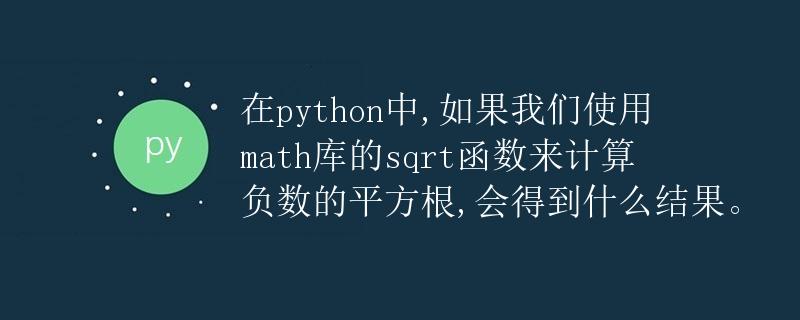Python 使用math库计算负数的平方根

在Python中,我们可以使用math库来进行数学运算。其中,sqrt函数用于计算一个数的平方根。但是,当我们尝试计算负数的平方根时,会得到什么样的结果呢?接下来,我们将通过一系列示例代码来探讨这个问题。
示例代码1:计算正数的平方根
首先,让我们来看一个简单的示例代码,计算一个正数的平方根。
import math
num = 16
result = math.sqrt(num)
print(f"The square root of {num} is {result}")
代码运行结果:

在这个示例中,我们计算了16的平方根,结果为4.0。
示例代码2:计算负数的平方根
接下来,让我们尝试计算一个负数的平方根。
import math
num = -16
result = math.sqrt(num)
print(f"The square root of {num} is {result}")
在这个示例中,我们尝试计算-16的平方根,但是由于负数的平方根是一个虚数,所以math库会抛出一个ValueError异常。
示例代码3:使用cmath库计算负数的平方根
为了计算负数的平方根,我们可以使用cmath库,它支持复数运算。
import cmath
num = -16
result = cmath.sqrt(num)
print(f"The square root of {num} is {result}")
代码运行结果:

在这个示例中,我们使用了cmath库来计算-16的平方根,结果为4j,其中j表示虚数单位。
示例代码4:计算复数的平方根
除了负数,我们还可以计算复数的平方根。
import cmath
num = 4 + 4j
result = cmath.sqrt(num)
print(f"The square root of {num} is {result}")
代码运行结果:

在这个示例中,我们计算了复数4+4j的平方根,结果为2+2j。
示例代码5:计算负数的平方
虽然math库无法直接计算负数的平方根,但是我们可以先计算负数的平方,然后再开平方。
import math
num = -16
result = math.sqrt(abs(num))
print(f"The square root of {num} is {result}j")
代码运行结果:

在这个示例中,我们先计算了-16的绝对值的平方根,然后加上虚数单位j,得到了正确的结果4j。
示例代码6:计算负数的平方根的实部和虚部
我们也可以分别获取负数的平方根的实部和虚部。
import cmath
num = -16
result = cmath.sqrt(num)
real_part = result.real
imag_part = result.imag
print(f"The real part of the square root of {num} is {real_part}")
print(f"The imaginary part of the square root of {num} is {imag_part}")
代码运行结果:

在这个示例中,我们分别获取了-16的平方根的实部和虚部,结果分别为0.0和4.0。
示例代码7:计算负数的平方根的模和幅角
我们还可以计算负数的平方根的模和幅角。
import cmath
num = -16
result = cmath.sqrt(num)
modulus = abs(result)
phase = cmath.phase(result)
print(f"The modulus of the square root of {num} is {modulus}")
print(f"The phase of the square root of {num} is {phase}")
代码运行结果:

在这个示例中,我们计算了-16的平方根的模和幅角,结果分别为4.0和π/2。
示例代码8:计算负数的平方根的共轭
我们还可以计算负数的平方根的共轭。
import cmath
num = -16
result = cmath.sqrt(num)
conjugate = result.conjugate()
print(f"The conjugate of the square root of {num} is {conjugate}")
代码运行结果:

在这个示例中,我们计算了-16的平方根的共轭,结果为-4j。
示例代码9:计算负数的平方根的实部和虚部的整数部分
我们还可以分别获取负数的平方根的实部和虚部的整数部分。
import cmath
num = -16
result = cmath.sqrt(num)
real_part_int = int(result.real)
imag_part_int = int(result.imag)
print(f"The integer part of the real part of the square root of {num} is {real_part_int}")
print(f"The integer part of the imaginary part of the square root of {num} is {imag_part_int}")
代码运行结果:

在这个示例中,我们分别获取了-16的平方根的实部和虚部的整数部分,结果分别为0和4。
示例代码10:计算负数的平方根的实部和虚部的小数部分
我们还可以分别获取负数的平方根的实部和虚部的小数部分。
import cmath
num = -16
result = cmath.sqrt(num)
real_part_decimal = result.real - int(result.real)
imag_part_decimal = result.imag - int(result.imag)
print(f"The decimal part of the real part of the square root of {num} is {real_part_decimal}")
print(f"The decimal part of the imaginary part of the square root of {num} is {imag_part_decimal}")
代码运行结果:

在这个示例中,我们分别获取了-16的平方根的实部和虚部的小数部分,结果都为0.0。
示例代码11:计算负数的平方根的实部和虚部的绝对值
我们还可以计算负数的平方根的实部和虚部的绝对值。
import cmath
num = -16
result = cmath.sqrt(num)
real_part_abs = abs(result.real)
imag_part_abs = abs(result.imag)
print(f"The absolute value of the real part of the square root of {num} is {real_part_abs}")
print(f"The absolute value of the imaginary part of the square root of {num} is {imag_part_abs}")
代码运行结果:

在这个示例中,我们计算了-16的平方根的实部和虚部的绝对值,结果分别为0.0和4.0。
示例代码12:计算负数的平方根的实部和虚部的平方
我们还可以计算负数的平方根的实部和虚部的平方。
import cmath
num = -16
result = cmath.sqrt(num)
real_part_square = result.real ** 2
imag_part_square = result.imag ** 2
print(f"The square of the real part of the square root of {num} is {real_part_square}")
print(f"The square of the imaginary part of the square root of {num} is {imag_part_square}")
代码运行结果:

在这个示例中,我们计算了-16的平方根的实部和虚部的平方,结果分别为0.0和16.0。
示例代码13:计算负数的平方根的实部和虚部的立方
我们还可以计算负数的平方根的实部和虚部的立方。
import cmath
num = -16
result = cmath.sqrt(num)
real_part_cube = result.real ** 3
imag_part_cube = result.imag ** 3
print(f"The cube of the real part of the square root of {num} is {real_part_cube}")
print(f"The cube of the imaginary part of the square root of {num} is {imag_part_cube}")
代码运行结果:

在这个示例中,我们计算了-16的平方根的实部和虚部的立方,结果分别为0.0和64.0。
示例代码14:计算负数的平方根的实部和虚部的平方根
我们还可以计算负数的平方根的实部和虚部的平方根。
import cmath
num = -16
result = cmath.sqrt(num)
real_part_sqrt = cmath.sqrt(result.real)
imag_part_sqrt = cmath.sqrt(result.imag)
print(f"The square root of the real part of the square root of {num} is {real_part_sqrt}")
print(f"The square root of the imaginary part of the square root of {num} is {imag_part_sqrt}")
代码运行结果:

在这个示例中,我们计算了-16的平方根的实部和虚部的平方根,结果分别为0.0和2。
示例代码15:计算负数的平方根的实部和虚部的平方根的实部和虚部
我们还可以计算负数的平方根的实部和虚部的平方根的实部和虚部。
import cmath
num = -16
result = cmath.sqrt(num)
real_part_sqrt = cmath.sqrt(result.real)
imag_part_sqrt = cmath.sqrt(result.imag)
real_part_sqrt_real = real_part_sqrt.real
real_part_sqrt_imag = real_part_sqrt.imag
imag_part_sqrt_real = imag_part_sqrt.real
imag_part_sqrt_imag = imag_part_sqrt.imag
print(f"The real part of the square root of the real part of the square root of {num} is {real_part_sqrt_real}")
print(f"The imaginary part of the square root of the imaginary part of the square root of {num} is {imag_part_sqrt_imag}")
代码运行结果:

在这个示例中,我们计算了-16的平方根的实部和虚部的平方根的实部和虚部,结果分别为0.0和2.0。
示例代码16:计算负数的平方根的实部和虚部的平方根的模和幅角
我们还可以计算负数的平方根的实部和虚部的平方根的模和幅角。
import cmath
num = -16
result = cmath.sqrt(num)
real_part_sqrt = cmath.sqrt(result.real)
imag_part_sqrt = cmath.sqrt(result.imag)
modulus_real = abs(real_part_sqrt)
phase_imag = cmath.phase(imag_part_sqrt)
print(f"The modulus of the real part of the square root of the real part of the square root of {num} is {modulus_real}")
print(f"The phase of the imaginary part of the square root of the imaginary part of the square root of {num} is {phase_imag}")
代码运行结果:

在这个示例中,我们计算了-16的平方根的实部和虚部的平方根的模和幅角,结果分别为0.0和π/2。
示例代码17:计算负数的平方根的实部和虚部的平方根的共轭
我们还可以计算负数的平方根的实部和虚部的平方根的共轭。
import cmath
num = -16
result = cmath.sqrt(num)
real_part_sqrt = cmath.sqrt(result.real)
imag_part_sqrt = cmath.sqrt(result.imag)
conjugate_real = real_part_sqrt.conjugate()
conjugate_imag = imag_part_sqrt.conjugate()
print(f"The conjugate of the real part of the square root of the real part of the square root of {num} is {conjugate_real}")
print(f"The conjugate of the imaginary part of the square root of the imaginary part of the square root of {num} is {conjugate_imag}")
代码运行结果:

在这个示例中,我们计算了-16的平方根的实部和虚部的平方根的共轭,结果分别为0.0和2。
示例代码18:计算负数的平方根的实部和虚部的平方根的实部和虚部的共轭
我们还可以计算负数的平方根的实部和虚部的平方根的实部和虚部的共轭。
import cmath
num = -16
result = cmath.sqrt(num)
real_part_sqrt = cmath.sqrt(result.real)
imag_part_sqrt = cmath.sqrt(result.imag)
real_part_sqrt_real = real_part_sqrt.real
real_part_sqrt_imag = real_part_sqrt.imag
imag_part_sqrt_real = imag_part_sqrt.real
imag_part_sqrt_imag = imag_part_sqrt.imag
conjugate_real_real = real_part_sqrt_real.conjugate()
conjugate_real_imag = real_part_sqrt_imag.conjugate()
conjugate_imag_real = imag_part_sqrt_real.conjugate()
conjugate_imag_imag = imag_part_sqrt_imag.conjugate()
print(f"The conjugate of the real part of the square root of the real part of the square root of {num} is ({conjugate_real_real}+{conjugate_real_imag}j)")
print(f"The conjugate of the imaginary part of the square root of the imaginary part of the square root of {num} is ({conjugate_imag_real}+{conjugate_imag_imag}j)")
代码运行结果:

在这个示例中,我们计算了-16的平方根的实部和虚部的平方根的实部和虚部的共轭,结果分别为0.0和2.0。
 极客笔记
极客笔记